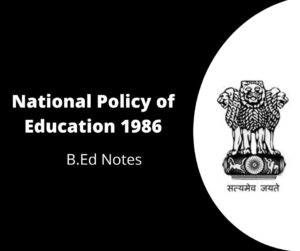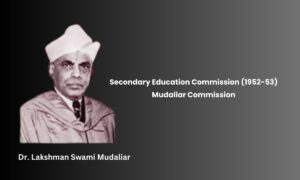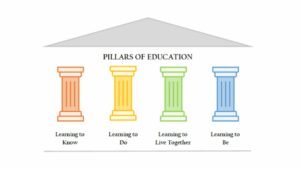National Education Commission (1964-66) is also known as Kothari Commission or Indian Education Commission. The commission was set up under the chairmanship of Dr. Daulat Singh Kothari, to suggest recommendations to overhaul and reconstruct the entire field of education. He was a great Indian Physicist and Educationist. He worked under the Greatest Ernest Rutherford.
The Kothari Commission was set up on 14 July 1964 and submitted its report on 29 June 1966. The title of this report is “Education and National Development”. It consists of 17 members among them 5 educationists from several countries such as U.K, USSR, USA, France and Japan
The Education Commission was the most comprehensive in nature, it review almost all aspects of the education System in India at that time
Aims of National Education Commission/Kothari Commission
The fourfold aims of the Kothari Commission are-
- Increasing National Productivity: In order to make education practical and to promote the productivity of the nation, science education and work experience must be an integral part of all education.
- Achieving Social and National Integration: Achieving National and Social integration is an important aim of our education system. The commission recommended following aims should be achieved-
- Introducing a common school system of public education- which will be open to all children irrespective of caste, creed, community, religion, economic conditions or social status.Obligatory social and national service for all students at all stages of development of an appropriate language policy
- Inculcation of Democratic Values
- Accelerating the process of Modernization: The commission felt the need of Modernization in all walks of national life in order to achieve the national Goal. Education should produce educated and skilled citizens and train an adequately and competent.
- Cultivating Social, Moral and Spiritual Values: The commission emphasized character building through social, moral and spiritual values in the students at all stages of education. It recommended that central and state govt. should adopt measures to introduce education in moral, social and Spiritual values in all institutions.
Kothari Commission Recommendations
1. Free and Compulsory education
Provision for free and Compulsory Education for children of the age group of 6-14 Years under the Directive Principles of State Policy (DPSP) under Article 45 of the Constitution of India.
2. Status of Teacher Education
- The Kothari Commission emphasizes providing favourable and adequate service conditions for teachers.
- Teachers should get academic freedom to pursue and publish independent studies and research.
- Special Courses should be available for in-service teachers so that they can also enhance their skills.
- Teacher programs should be upgraded as per the need of time and conditions.
- The emphasis on a basic pay band for the teachers as per their teaching post, area of posting and their qualification.
- There should be training and accommodation facilities for the teacher who posted in tribal areas
3. Language Policy
The commission emphasizes three language formulas to bridge the communication gap between North Indian and South Indian peoples.
The first Language should be the mother tongue of the regional language and Second language can choose from a National or Union or Associate language and the Third language can be one modern Indian or European language
- Mother Tongue should be compulsory at the primary level of education
- A second language should be added at the higher primary stage either Hindi or English
- At the lower secondary stage, all three languages should be studied Mother Tongue, Hindi or Modern Indian Language and English
- At a higher secondary level, any two of these languages should be compulsory
- At the university level, no language should be compulsory.
4. Equalization of Education Opportunities
To promote Social justice, the Kothari Commission focused on girls’ education, education of backward classes, education of tribal people, and physically and mentally handicapped children.
5. Identification of Talent
The commission suggested the Early detection of Talent in Children and providing a suitable platform to show their talent
6. Work experience & National service
Work experience should be introduced as an integral part of all education; general and vocational. The kind of programmers should be included so that students can learn how to do things in real settings. Work experience means participation in productive work such as craft, agriculture etc.
7. Science Education and Research
Science and maths should be integral parts of education. At the university level, it should be improved and special importance should be given to the development of scientific research and development.
8. Education for Agriculture and Industry
The commission recommended that special emphasis should be placed on the development of education for Agriculture and industry and there should be at least one Agricultural University in Every State
9. Production of Books: Good Quality of books
- The commission suggested the following things for the Production of a Quality Textbook
- The education commission recommended that immediate steps should be taken for the production of high-quality textbooks for schools and universities.
- Frequent changes of textbooks should be avoided and their price should be low.
- To recruit the best authors, and subject matter experts to write a quality book
- The textbooks should be as per the needs of learners and should include all the aspects of learning
- There should be continuous upgradation of textbooks in future also
10. Examinations Reforms
- The new methods of evaluation should be included to assess the children properly and continuously by methods like oral tests, observations, written examinations and other methods.
- The commission recommended the internal assessment should be started and the internal assessment should be comprehensive, which means should include all the aspects of students’ academic life
- The commission suggested that the Board examination only for the class 10th and 12th
11. Secondary education
There is a need to increase facilities for technical and vocational education at the secondary stages of education and for that polytechnic institutes would be established all over the country
12. University Education
Improve education at the university level by paying special attention to postgraduate-level research, and training, and providing adequate libraries, laboratories and funds.
13. Part-Time & Correspondence Education
Part-time education and correspondence courses should be developed on a large scale
14. Spread of Literacy and Adult Education
- The Kothari Commission suggested that all the Govt. and Non-Governmental institutions, State or central should involve in literacy programmes for all men and Women in the country
- Students and Teachers should involve in adult literacy campaigns and part-time education should be there for individuals who have not attended school or left it after literacy.
- There should be followed up from time to time so that these campaigns run effectively.
15. Games and Sports
Games and sports should be developed on a larger scale with the object of improving the physical fitness and sportsmanship of the average students as well as of those who excel in this department
16. Reorganization of Educational Structure
- The structural pattern recommended by the commission is 10+2+3
- All the different names such as kindergarten, Montessori and pre-basic should be renamed as pre-primary
- The primary education is renamed as Lower Primary Up to 4th class and from class VI to VIII is named Upper Primary and Class 9th and 10th are named High school
- The undergraduate education from 11th and 12th standard to Higher Secondary
- The degree course should be 3 years
- The age of admission to class-I should not be less than 6 years
Conclusion
Kothari Commission or National Education Commission 1964-66 is chaired under D.S Kothari is an Adhoc Commission. The commission creates 12 Task Forces and 7 working Groups to work on the different aspects of Education. Kothari Commission was the most comprehensive in nature, it review almost all aspects of the education System in India at that time. Education Commission is a Landmark in the History of Indian Education.
The Kothari Commission is majorly focused on reforms in the Educational structure and Three language formula. At present time National Policy of Education 2020 is replacing the old 10+2+3 education Structure with the New 5+3+3+4 system
Reference
- http://indianculture.gov.in/reports-proceedings/report-education-commission-1964-66



